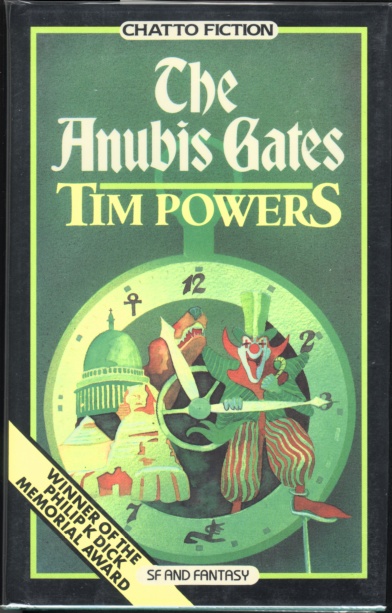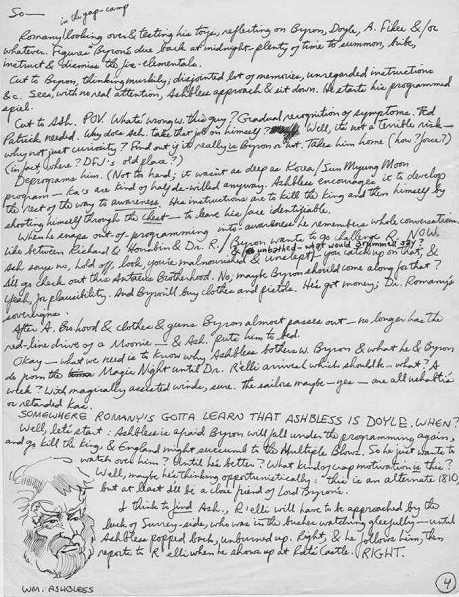March 20, 2005
PLUGS
1. The official listing for the Scanshifts/ k-punk audiomentary londonunderlondon, to be broadcast April 4th. Still in final phase of production, with contributions from Dissensus/ old skool blog massive such as Craner and Evergreen Jim already happening --- Heronbone yet to be induced into recording his txt, but I've not given up hope.
2. (Related to the above, since I re-read the book as part of the research for LuL). Me on Tim Powers' The Anubis Gates and closed loop time paradoxes at Hyperstition.

I first read about The Anubis Gates in Stephen Jones' and Kim Newman's delightfully compendious Horror: 100 Best Books. (This was also where I first heard tell of another hyperstitional classic, Robert Holdstock's Mythago Wood). The entry on The Anubis Gates was written by the brilliant science fiction critic John Clute, who rightly saw The Anubis Gates as profoundly Dickensian. '[T]he Gothic fever-dreams of such writers as Monk Lewis or Charles Maturin can be seen to underpin the oneiric inscapes of the greatest achievements of Dickens - Bleak House (1852-3) or Little Dorrit (1855-7) or Our Mutual Friend (1865) - these novels in which the nightmare of London attains lasting and definitive and horrific form. For Dickens, that nightmare of London may be a prophetic vision of humanity knotted into the subterranean entrails of the city machine, while for Powers the London of 1810 may be a form of nostalgia, a dream theatre for the elect to star in, buskined and immune; but at the heart of both writers' work glow the lineaments of the last world city.' All the sentimental overcodes hymning hearth and home cannot conceal the fact that the libidinal motor of Dickens steam pulp engine is the energy and topology of the pack-rhizome. The happy endings in which the street urchins are esconced into the warm glow of sedentary familality are always disappointing but libidinally unconvincing, terminations of the populations and movements which sustain the novels' desiring-plateaus. Scanshifts tells me that Dickens was crestfallen when he went to Zurich because the city wasn't big enough to contain his walks: all too soon, he would find himself out in the country.

One glorious moment I didn't mention in the Hypersition piece is Powers' joke at the expense of Coleridge (and by extension the whole Romantic cult of the creative imagination). Towards the climax of the book, Coleridge is abducted and imprisoned in the catacombs presided over by the beggar king-sorcerer-clown Horrabin. Horrabin's magic seems to involve an element of Frankensteinian-Moreauesque slash and paste ('the clown's opened up the Hospital' is one of the most terrifying lines in the book), and the lower levels of his subterranean kingdom are filled with shambling, chittering sorcerous-surgical monstrosities that the appalled beggar minions refer to as 'Orrabin's Mistakes. Coleridge, who has been drugged with laudanum (Horrabin's henchmen not suspecting that he is an addict have under-dosed the old poet) wanders amid the Boschian Londerworld, convinced that the loathsome apparitions are aspects of his own mind. The step from the 'creative efflorescence' of the Romantic Imagination to platitudes beloved of delibidinizers everywhere (hey, the heart of darkness is the darkness WITHIN US) is really very short.
btw: was reading The Anubis Gates on the train from Hampton Court to Shepperton whilst on a method writing tour of South London for LuL a couple of weeks ago when the train guard saw it and said, 'That's the best book ever written...'
3. An intereting newish blog cPROBES (Zizek, Baudrillard, McLuhan...) which also has a Lacan/Zizek glossary and a handy page of Baudrillard links.
Posted by mark at March 20, 2005 11:06 AM | TrackBack